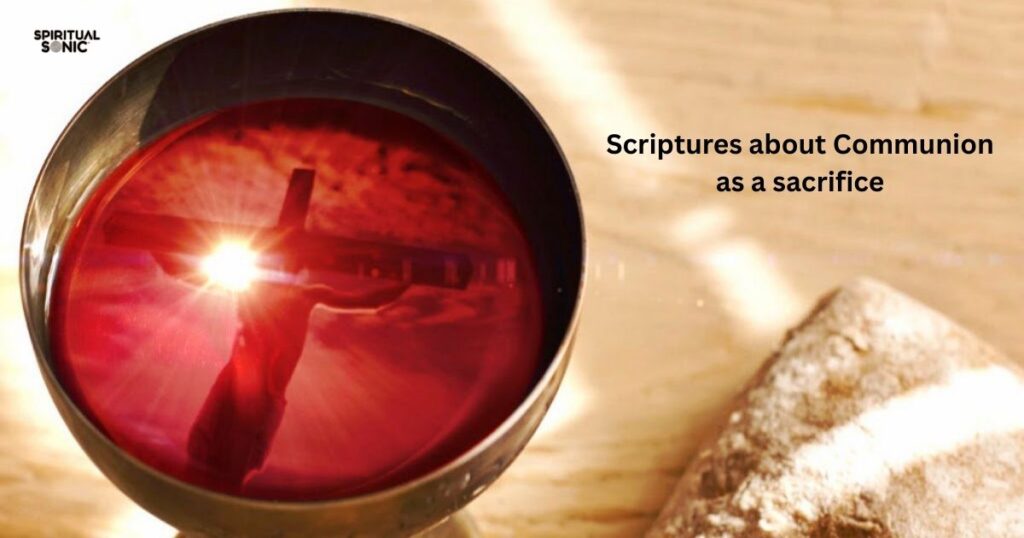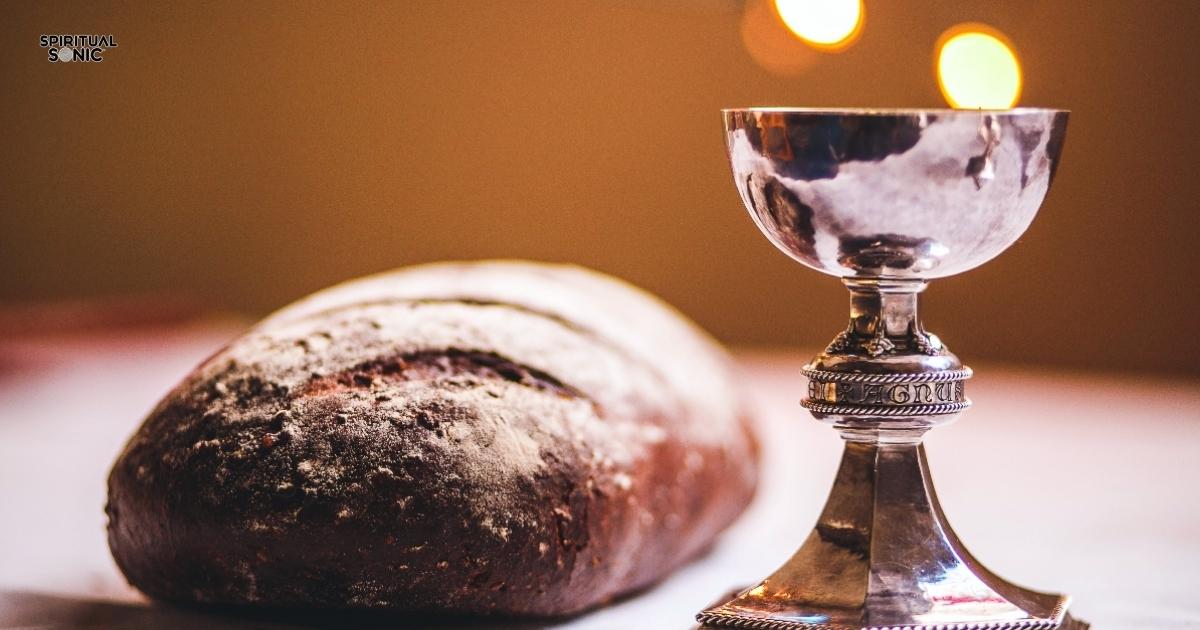Communion Scripture refers to the Bible passages that explain the practice of sharing bread and wine to remember the body and blood of Jesus Christ. This sacred tradition, also known as the Lord’s Supper or Eucharist, was instituted by Jesus during the Last Supper with his disciples. The Communion Scriptura emphasize its importance in the Christian faith as a way to reflect on Jesus’ sacrifice for humanity.
In the Communion Scripture, Jesus’ words and actions give profound meaning to this act of remembrance. For example, in the Gospels, He breaks the bread, gives thanks, and tells His followers that the bread is His body and the wine His blood. These scriptures remind believers of the depth of Christ’s love and the covenant He established. Communion is not just a ritual but a time for spiritual reflection, community, and thanksgiving, as seen in the early church’s gatherings.
Communion in the Bible
Communion in the Bible is a sacred practice deeply rooted in Christian tradition, symbolizing believers’ intimate relationship with Jesus Christ. The act of communion, or the Lord’s Supper, is a reminder of Christ’s sacrifice, where believers partake of bread and wine to honor His body and blood. The Communion Scripture in the Bible offers a spiritual connection to Christ’s suffering and resurrection. One of the key passages is from 1 Corinthians 11:23-26, where Paul instructs the Church to observe the Lord’s Supper in remembrance of Jesus’ death until His return.
In the Communion Scripture, the bread signifies Jesus’ body, which was broken for humanity, and the wine symbolizes His blood, shed for the forgiveness of sins. The New Testament teaches that participating in communion is an act of faith, unity, and proclamation of the gospel. It is a reminder to believers that Christ’s death offers eternal life and reconciliation with God. Communion in the Bible also calls for self-examination, ensuring that partaking in this sacred meal is done with reverence and in a worthy manner.
- Jesus Instituted the Lord’s Supper: Jesus shared bread and wine with His disciples during the Last Supper, symbolizing His body and blood, commanding them to partake in remembrance of Him (Luke 22:19-20).
- Paul’s Instruction on Communion: In 1 Corinthians 11:23-26, Paul emphasizes the importance of communion as an act of remembrance and proclamation of Jesus’ death, urging believers to partake with reverence and self-examination.
- The Passover and Communion: Jesus’ Last Supper coincided with the Jewish Passover meal, transforming its meaning into a memorial of His sacrifice, as seen in Matthew 26:17-30.
- The New Covenant: Jesus’ blood, poured out during communion, signifies the establishment of a new covenant, fulfilling Old Testament prophecies about redemption (Matthew 26:28).
- Jesus’ Presence in Communion: In John 6:53-58, Jesus speaks of the necessity of eating His flesh and drinking His blood, symbolizing the intimate relationship believers have with Him through communion.
- Communion as a Shared Meal: In Acts 2:42, the early church continued the practice of breaking bread together, symbolizing unity among believers and the ongoing fellowship with Christ.
The significance of Communion Scripture extends beyond the meal itself; it points to the profound spiritual reality of being one with Christ. Jesus instituted this sacrament during the Last Supper with His disciples, marking it as a central aspect of Christian worship. For believers, communion serves not only as an act of remembrance but also as an ongoing reflection of their relationship with Christ. By adhering to the teachings of Communion Scripture, Christians continue to honor the legacy of Jesus’ sacrifice in their spiritual journey.
Best short Bible verses on communion

Luke 22:19
And He took bread, gave thanks and broke it, and gave it to them, saying, “This is My body, which is given for you; do this in remembrance of Me.”
1 Corinthians 11:24
And when He had given thanks, He broke it and said, “This is My body, which is for you; do this in remembrance of Me.”
1 Corinthians 11:25
In the same way, after supper He took the cup, saying, “This cup is the new covenant in My blood; do this, whenever you drink it, in remembrance of Me.”
Matthew 26:29
I tell you, I will not drink from this fruit of the vine from now on until that day when I drink it new with you in My Father’s kingdom.
John 6:56
Whoever eats My flesh and drinks My blood remains in Me, and I in them.
Acts 2:42
They devoted themselves to the apostles’ teaching and to fellowship, to the breaking of bread and to prayer.
Related Post: Biblically accurate angels: see descriptions in the Bible
7 key Scripture on communion
The seven key Scriptures on communion highlight its importance in remembering Christ’s sacrifice, symbolizing His body and blood through bread and wine, and reinforcing the new covenant between believers and God.
Here are 7 key Scriptures on communion in simple English:
- Mark 14:22-26
As they ate, Jesus took bread, blessed it, and broke it, saying, “This is my body.” He then gave them the cup, saying, “This is my blood of the new covenant.” - Matthew 26:26-30
During the meal, Jesus took bread, broke it, and said, “This is my body.” He then shared the cup, saying, “This is my blood, poured out for the forgiveness of sins.” - Luke 22:14-20
At the meal, Jesus broke the bread and said, “This is my body, given for you. Do this to remember me.” He also shared the cup, calling it the new covenant in His blood. - John 6:47-58
Jesus says, “I am the bread of life. Anyone who eats of this bread will live forever. My flesh is true food, and my blood is true drink.” - 1 Corinthians 10:15-21
Paul explains that when we drink the cup and eat the bread, we share in the body and blood of Christ. We cannot partake in both the Lord’s table and the table of demons. - 1 Corinthians 11:20-27
Paul reminds us that when we gather for communion, it is a time to remember Jesus’ sacrifice. Taking communion in an unworthy way brings guilt upon us. - Revelation 19:9
The angel said, “Blessed are those who are invited to the wedding supper of the Lamb.” This signifies the eternal celebration we’ll have with Christ.
Scriptures about Communion as a sacrifice

Communion is deeply tied to the concept of sacrifice in Scripture. Jesus’ body, symbolized by bread, and His blood, represented by the cup, were given as a sacrifice for humanity’s sins. In Matthew 26:28, Jesus states, “This is my blood of the new covenant, which is poured out for many for the forgiveness of sins.” This Communion Scripture highlights His sacrificial role in bringing salvation.
In 1 Corinthians 11:24, Paul reminds believers, “This is my body, which is for you; do this in remembrance of me.” The act of breaking the bread is a reminder of the ultimate sacrifice Christ made for the forgiveness of sin.
As we partake in communion, we reflect on the sacrifice of Jesus. His body was broken, and His blood was shed for us, offering eternal life through His sacrifice. The Communion Scripture calls us to honor this sacrifice, remembering the depth of God’s love and the promise of eternal life through Jesus Christ.
Bible verses about Communion in the early church
In the early church, Communion was central to Christian worship, as seen in Acts 2:42, where believers “devoted themselves to the apostles’ teaching, to fellowship, to the breaking of bread, and to prayer,” highlighting its foundational importance.
Acts 2:42-46,
The early church was deeply committed to learning from the apostles, sharing fellowship, praying, and breaking bread together. This close community lived in harmony, supporting each other by sharing their possessions. Every day, they gathered at the temple and broke bread at home, celebrating with joy and unity.
Acts 20:7,
We see the disciples meeting on the first day of the week to break bread. Paul spoke to them until midnight, knowing it would be his last chance to gather with them before leaving.
FAQ’s
What is the Communion Scripture?
The Communion Scripture refers to Bible verses that describe Jesus’ institution of the Eucharist, highlighting His body and blood in bread and wine.
Where can I find the Communion Scripture in the Bible?
The Communion Scripture can be found in the Gospels, especially in Matthew 26:26-29, Mark 14:22-25, Luke 22:19-20, and 1 Corinthians 11:23-26.
Why is the Communion Scripture important?
The Communion Scripture teaches Christians the significance of Jesus’ sacrifice. It reminds believers of the new covenant through His body and blood, bringing spiritual unity.
How often should we read the Communion Scripture?
Christians are encouraged to read the Communion Scripture during communion services and personal reflections. Regular reading deepens understanding of the meaning behind the sacrament.
What does the Communion Scripture teach us about Jesus?
The Communion Scripture highlights Jesus’ love and sacrifice, offering His body and blood for the forgiveness of sins, and establishing a new covenant for believers.
Conclusion
The Communion Scripture holds great significance for Christians, offering a powerful reminder of Jesus’ sacrifice for humanity. Through the scriptures, believers understand that communion represents Christ’s body and blood, shared to bring salvation. The Communion Scripture invites us to reflect on the deep love and grace shown by Jesus, as we partake in this sacred act of remembrance.
In addition to remembering Christ’s sacrifice, the Communion Scripture teaches us the importance of unity in the body of Christ. It is a time for believers to come together, sharing in the gift of eternal life offered through Jesus. The Communion Scripture also establishes the new covenant, reminding us of the lasting promise God made through Christ. By embracing these scriptures, Christians are empowered to live out their faith with gratitude, reverence, and a renewed commitment to Christ’s teachings.

Henry Davis – Content Writer
With three years of experience as a website content creator, I specialize in crafting engaging, SEO-friendly content that resonates with diverse audiences. My expertise spans various niches, ensuring high quality, well researched articles that enhance user engagement and drive organic traffic. Passionate about delivering value through words, I strive to create content that not only informs but also inspires action.

